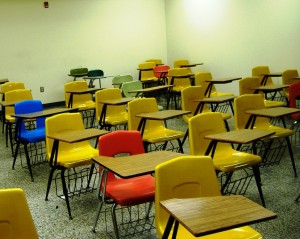How Much Counseling Does A School Counselor Do? Not Much.
The Indiana Chamber of Commerce released a report today looking at the state of school counselors in Indiana. The main takeaway – counselors are doing little counseling with students.
426 teachers were surveyed and 43 percent said 10-25 percent of their time is spent on helping students prepare for college and future jobs. Instead, the counselors report they spend most of their time doing tasks not suited to their skills such as monitoring lunch, doing bus duty, substitute teaching and even coordinating the school mascot costume.
This comes at a time when student preparedness for college and future jobs is a major focus of legislators, educators and education leaders in the state.
Indiana has the most schools in the country meeting national standards for school counseling programs.
Susie Bremen, a counselor in the state and President of the Indiana Association of College Admission Counseling says counselors are not doing their job because other educators don’t know what the job of a counselor is.
“Whenever a school doesn’t know what to do with a project, it goes to the counselor,” Bremen says. “I don’t think [administrators or teachers] understand the role of the school counselor; they just don’t understand what they do.”
Indiana Public Broadcasting’s Brandon Smith reports on the Chamber’s reaction to the outcome of the report:
Chamber Vice President Derek Redelman says the solution isn’t necessarily more counselors – he says teachers need to help promote college and career readiness by connecting their lessons to real-world application. And he says parent expectations are part of the issue
“The parents don’t really like to hear anything other than top tier, four year options for their students,” Redelman says. “We talk a lot about maybe parents not having high expectations for their kids. In this case, sometimes maybe the expectations are a little too narrow at the top end.”
Redelman says the current school accountability standards are also at fault because they focus too much on four-year degree preparation, emphasizing Advanced Placement, SAT scores and dual credit. He says more attention needs to be paid to preparing students for postsecondary options like job certification training.
Other issues addressed in the report are high student to counselor ratios, lack of elementary school counselors and the increase of addressing mental health needs of students.
